With struggling farmers threatening to take to the streets and formidable president Minette Batters stepping down, this week’s NFU Conference in Birmingham was guaranteed its fair share of headlines.
And that was before Rishi Sunak made the first prime ministerial appearance since Gordon Brown in 2008.
So what are the main takeouts from the conference?
Coming as it did in an election year, there was a distinctly political theme throughout, with the main political parties given a platform to make their pitch for the farming vote. And as always there was a strong undercurrent of dissatisfaction, relating to the significant challenges facing farmers. From increasingly volatile weather events to low returns driven by supermarket price wars and competition from imports produced to lower standards. But the conference was also tinged with sadness as Batters went into bat for farmers one last time.
Sunak policy announcements
So when the PM hit the stage following a standing ovation for a clearly emotional Batters, he started by paying tribute to the outgoing NFU president, praising her for being “always fair, always thoughtful and always forceful”.
“If you asked some of my ministers down there, they would say very forceful,” he added.
Sunak also stressed his government really did care about the sector, before reeling off the farms and auction marts he had visited and the cows he had milked. He also insisted the government was “changing the culture” around food production and had listened.
A visit by the PM would not be complete without a series of policy announcements, which included a pledge to spend the full £2.4bn annual farming budget the government had already promised. It would include increasing payments for farmers within the post-CAP Environmental Land Management Schemes, plus £15m to tackle food waste.
In a nod to Jeremy Clarkson’s brushes with local officialdom, Sunak also pledged to reform planning rules, allowing farmers an easier route to build farm shops and commercial space.
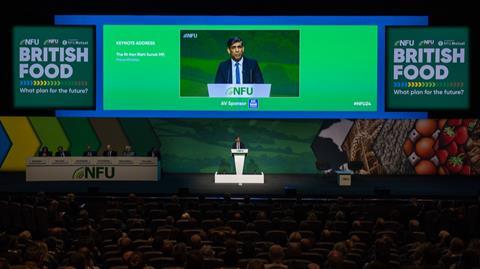
But perhaps the most important announcement was a commitment to carry out an annual statutory food security index “when parliamentary time allows”.
The first draft will be published at No 10’s Farm to Fork Summit this spring – which will now become an annual event, the PM added. “We focus sometimes on the headline number, 75% self-sufficient in the foods that we can actually produce, but we need to improve on that,” he said. “The events of the last couple of years have demonstrated how important that is and that [with that] headline number, whilst respectable, underneath there are categories where there has been very surprising lack of self-sufficiency in areas.”
Sunak also took the opportunity to criticise Labour for its controversial proposals for Wales’ new Sustainable Farming Scheme, which have led to protests and fears the nation’s output could be sacrificed for tree-planting.
Given the high stakes in this election year, – and the amount of rural Tories under threat from a potential Labour win – many delegates told The Grocer they were surprised that Sunak’s performance and delivery felt muted or even “underwhelming”. Sunak’s trademark slickness was seemingly lost on a crowd of delegates dismayed by their lot.
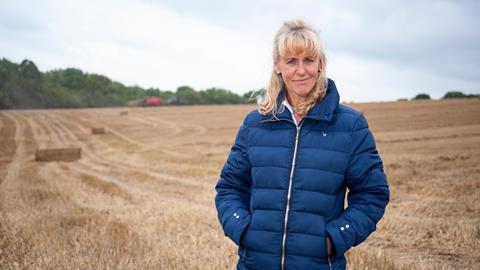
Batters still batters
Batters fought her emotions throughout the conference, but she didn’t hold back in her criticism of politicians, describing the Welsh government’s SFS proposals as “devastating”. In a press conference during the conference, she also said she was “not yet sure what [Labour’s] trade policy is”. One of her most forceful arguments centred around the behaviour of the supermarkets in pricing negotiations and her clarion call for more fairness.
In a message “to all food retailers” she called for “the culture at the top to change”. This meant more responsibility at board level for relationships with suppliers, she said.
Read more:
-
(Un-)inspired? Rishi Sunak says he’s got British food’s back
-
Tom Bradshaw elected NFU president
-
Chicken ‘artificially cheap’ in supermarkets despite price hikes
-
New dairy regulations and farmer protection could be adopted by other categories: NFU
Seasonal worker impasse
In a perhaps unsurprising twist for the horticulture sector, the PM did not use his presence at the conference to unveil an extension of the government’s seasonal workers scheme to the often-requested five-year rolling arrangement.
Sunak had confirmed the extension of the scheme for an additional year at last March’s Downing Street Farm to Fork summit, though government is yet to commit to any further extensions amid an ongoing debate around immigration within the Conservative Party.
NFU horticulture and potatoes board chair Martin Emmett said the current situation faced by growers, of the scheme being renewed yearly, was now “untenable”, adding the sector and had an “absolute dependency” on seasonal workers and required more forward planning.
Other farmers at the conference said the lack of a long-term plan on the issue was “absolutely ridiculous” as “we don’t know where we are next year”.
Emmett added that the slowness of the government to respond to reviews such as John Shropshire’s Independent Labour Review was also “frustrating” and he hoped that once the government had reviewed the probe, it would be compelled to act on seasonal worker arrangements.
As with other sectors, supply chain fairness also continued to be top of the agenda, with the government’s review into the horticulture sector closing for submissions this week.
Meanwhile, the continued flood issues and the lack of compensation to growers storing flood water on their land was also a bone of contention for delegates.
There was a tense discussion around flood policy with the head of the environment agency hearing of a series of distressing cases around the impact the floods from delegates and allegations the body did not care about the environment.
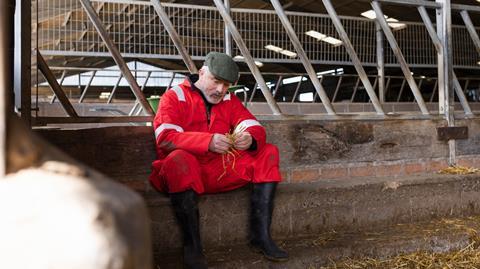
Spectre of protests
While the UK hasn’t yet experienced the sort of protests seen in Europe, the topic was never far away.
A host of delegates warned they were at the end of their tether in Q&A sessions with Sunak, in the election hustings and with the Environment Agency.
Even Batters pointed out protesting was a fundamental democratic right.
In echoes of the tone of campaign group No Farmers No Food, she warned “when you start disrupting people’s lives, it can very quickly go wrong”.
Noting the high public popularity of farmers, second only to nurses following the sector’s difficulties in recent years, she claimed, the situation “is only going to be resolved by sitting at the table and sorting it out,” she urged.
Beyond the walls of the conference in Birmingham, hundreds of farmers had barracked Welsh first minister Mark Drakeford when he visited Rhyl on Wednesday.
And with more than two thirds (73%) of farmers supporting the idea of farmer protests (according to rival organisation the British Farming Union) the question, as posed by anonymous social media star ‘The F in Farmer’, is can they organise sufficiently and are they “pissed off enough yet?” We’ll find out in the next few weeks







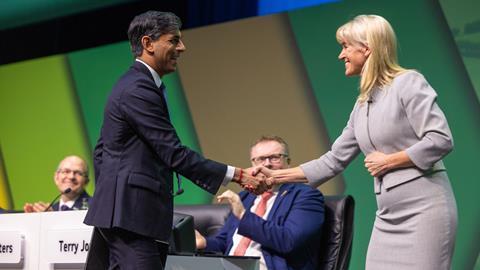
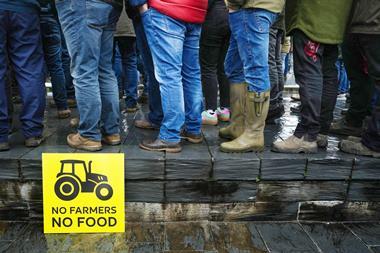
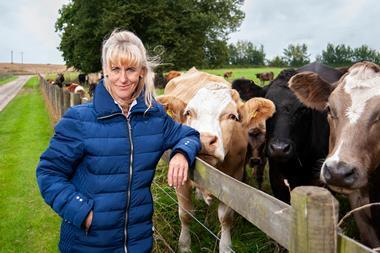
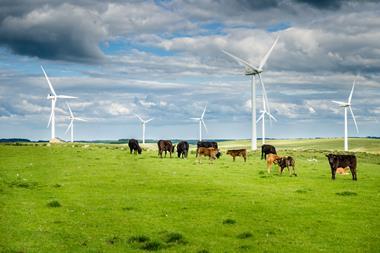
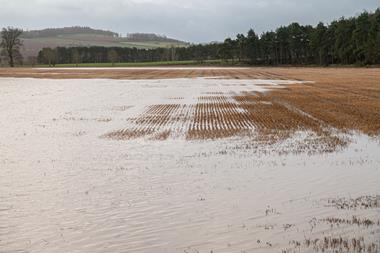



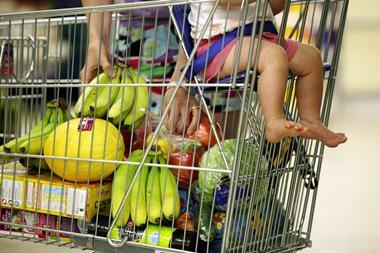




No comments yet